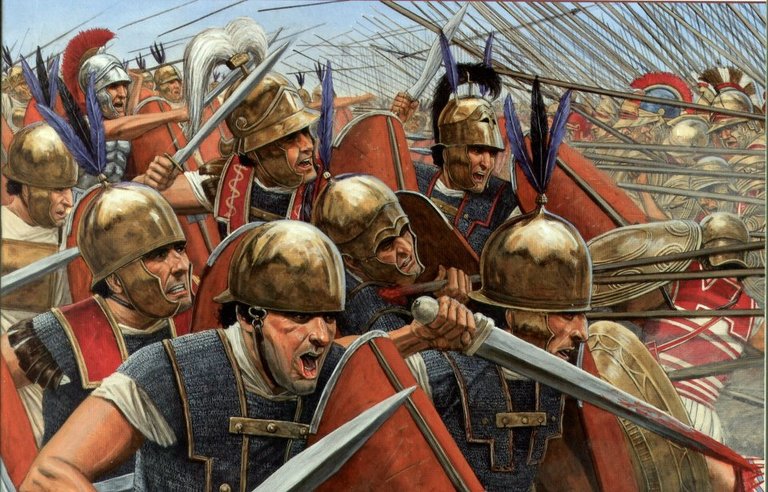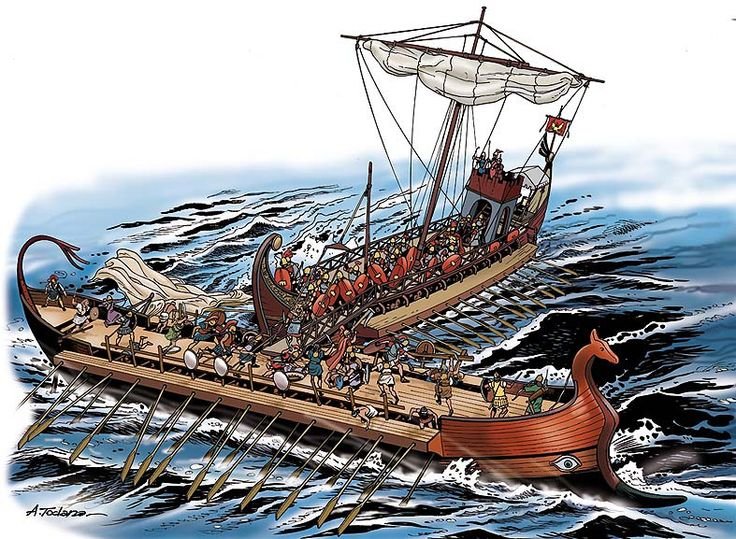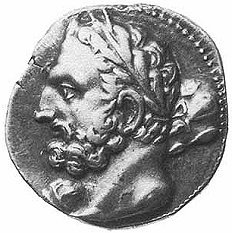Rome was a civilization that actually used its military, they were not allowed to just sit around doing nothing. As the empire continued to grow, it became a greater threat, especially to places like Carthage. These tensions eventually led to the Punic Wars which lasted from 264 B.C. to 146 B.C.

Troubles With Carthage
Carthage was a city, in what is now modern day Tunisia, founded by the Phoenicians. The Phoenicians were sea traders therefore Carthage had a large harbor with thousands of ships. Just like Rome, they had ideas to expand and their empire already included places like most of Sicily and Spain. However, by the 260's, they were getting quite arrogant. They began to call the Mediterranean sea a Carthaginian lake, suggesting they would soon own everything surrounding it.
There's a problem with that: Rome by 265 B.C. controlled everything south of the Rubicon River. They were getting nervous about this idea of a Carthaginian lake, while Carthage was nervous about Roman expansion. By this point, they were keeping a close eye on each other, which fueled distrust and tensions.

Doubts
Rome had a better army than Carthage, even though Carthage used mercenaries. Roman legions were commanded by able generals who rose through the ranks. Carthage excelled in its navy due to its long history in sea trading, while Rome had no existing navy. All they had were small ships that traveled up and down the Tiber River. However, Carthage is much more vulnerable because of their territories, allowing Rome multiple access points.
In order to have what Carthage wants, you only need to take their ships. This was a very wealthy empire that relied on trading to keep up that wealth. Yet no one thought Rome would ever win this fight; the backbone of their economy was farming. The war was completely unplanned as it suddenly broke out in a city-state in Sicily. It appealed to both Carthage and Rome so a struggle ensued. This is what is known as the first Punic War which lasted from 264 B.C. to 241 B.C.
War
Romans realized they couldn't defeat them without a navy, so they build one. A Carthaginian ship shipwrecked on the coast, this gave an opportunity for Romans to study it and copy it. Of course, like always, they're going to adapt the original design. Carthaginian ships were filled with sailors, Roman ships were loaded with soldiers. For their ships, they added a corvus to ram into Carthaginian ships and board them, turning a sea battle into a land battle.

There was one glaring flaw with this problem, the corvus made the ships very heavy. It worked fine in placid waters, but the Mediterranean is anything but. In 245 B.C. the Romans lose their entire fleet; 270 ships with about 100,000 men, all sank in a storm. To this day, this is the greatest maritime loss for a single country in history.
Carthaginians now realize their army needs work, so they hired Spartan mercenaries to train their infantry. This finally forced Rome and Carthage to a stalemate on both land and sea. After decades however, the Romans were able to capture an entire Carthaginian merchant fleet. While Carthage was looking over their books, they noticed they were losing too much money over this, so they ask for peace. Rome agrees to this, but for a price - they will make peace in exchange for money and Sicily. However the Romans end up taking Corsica and Sardinia for good measure.
New Lands
Rome now has something completely new. They have pieces of territory that are not connected to the peninsula, meaning something other than granting citizenship has to be done. Rome decides to turn these areas into provinces that would be ruled over by provincial governors.
Carthage certainly understands now that Rome is a force to be reckoned with and need a formidable army to take them on. Rather than hiring Spartan mercenaries again, they choose one of their own, a man named Hamilcar Barca. He fought in Sicily against the Romans during the first Punic War and learned to loathe them. He then is sent to Spain to form a strong army so that Carthage is sure to never be steamrolled by Rome again.

Interesting post. I also like history.
Upvoted and follow
Thank you!
Nice! I almost know roman history by heart xD but is good seing posts as these.
Keep it up! :D
I appreciate your support!
I am looking forward to the section on Hannibal!
I will be doing each Punic War separately so Hannibal is going to get his own section in my next post!
Buenas tardes @vestabesta
Dada la calidad de tus publicaciones, sería interesante que añadieras una traducción al Castellano o que hicieras otra publicación del mismo tema todo en Castellano y que además añadieras el tag "spanish".
Great post!
Good post👌@vestabesta ✌️